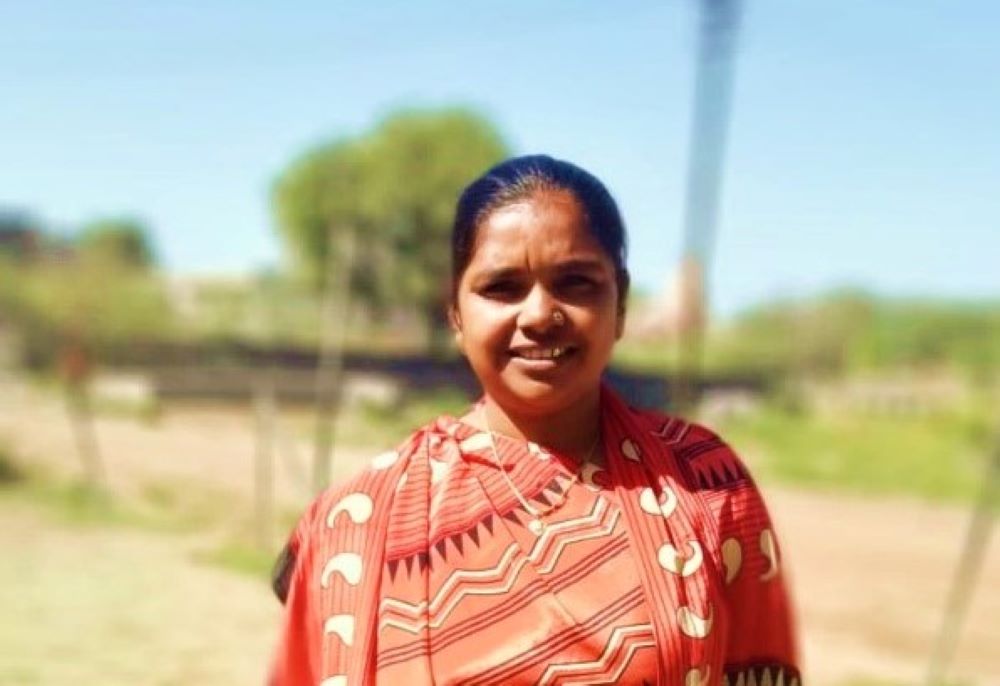All News
World Vision-led REACTS-IN receives $44 million to transform nutrition, empower women and promote gender equality
May 26, 2023
Community health champion Rekhaben Zampada is changing and saving lives in rural India
Rekhaben is an Accredited Social Health Activist (ASHA), a trained health educator and promoter deployed by the Government of Gujarat’s Department of Health and Family Welfare.
Posted on March 30, 2020

Gujarat, INDIA – Every day, Rekhaben Zampada walks down the streets of Jaira, a village in India’s westernmost state of Gujarat. She stops every few minutes to greet passers-by, on her way to visit every home in the community. She regularly fields questions from the people she meets with – most health-related and others just deeply personal. She listens calmly and offers advice and guidance.
This has been her daily routine for more than a decade.
Rekhaben is an Accredited Social Health Activist (ASHA), a trained health educator and promoter deployed by the Government of Gujarat’s Department of Health and Family Welfare. As the first point of contact for local communities and the public health care system, her work drives change from the ground up.
But her journey to become a health activist was not an easy one.
When she began her career as an ASHA, Rekhaben faced staunch opposition from her husband due to the time-intensive and demanding nature of her work, leaving her unable to dedicate herself solely to household duties. Despite this, her determination to do good helped her gain her in-laws’ support to keep her job.
In the field she grappled with age-old practices and the community’s unwillingness to utilize potentially life-saving medical advice and services. Despite her concerted efforts, they chose home births conducted by a traditional birth attendant over skilled birth care available in local hospitals.
“When I delivered my own child at the nearby community health centre, I was able to demonstrate the benefits of institutional delivery,” Rekhaben says. “I explained to the community how round-the-clock care is provided especially in case of any complication or emergency. Now, there are no home births in my village.”
Through trainings and workshops, Nutrition International has helped to bolster Rekhaben’s ability to save and improve the lives of people in her community. Since 2004, Nutrition International has been working with the Government of Gujarat to deliver integrated micronutrient programs and behaviour change interventions, and strengthen the health care system. Supporting various government-run maternal, child health and adolescent nutrition programs, Nutrition International has been able to improve the health and nutrition of millions of adolescent girls, children, and pregnant and lactating women.
In 2018, Nutrition International was supporting a session on iron-folic acid (IFA) and calcium supplementation during a Mamta Diwas, a monthly Village Health and Nutrition Day where community-based, comprehensive health and nutrition services are available. Rekhaben attended the session and gained a detailed understanding of the causes and prevention of anaemia, and the importance of nutrition and micronutrients.
Soon after, she created her own IFA tracking chart for her village.
Rekhaben also prevailed upon local primary schools to provide weekly iron and folic acid supplementation (WIFAS) to students. When one school principal refused to do so out of fear of potential health complications and liabilities, she convinced him to let her visit the school once a week to personally administer the supplements, telling him she could be held responsible for any side effects or complaints.
Keeping her word, Rekhaben visited the school every Wednesday − staying until each student had their IFA tablet and the teacher had entered their data into the attendance register. Inspired by her commitment, the principal took over the WIFAS program a month later and it has since become a regular feature at the school.
It is easy to see the profound difference Rekhaben has made in her community. She is a constant source of strength to them as well as other ASHAs in the area, earning her well-deserved reputation and recognition.